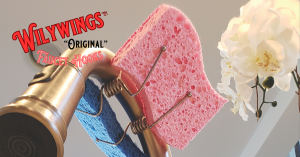Faucet Hooks: New Kitchen & Bath Category Creates Usable Space Above the Sink
The Malibu, CA-based venture may benefit from tariffs on Chinese goods.
The innovative hooks attach to almost any kitchen, bathroom, shower or utility faucet to create useful space for drying sponges, brushes, loofahs, baby pacifiers, and more. Sawyer takes credit for establishing a new proprietary home goods subcategory above sinks, and he hopes Wilywings will soon become ubiquitous. “Every home with running water can benefit from the convenience of drying small items above sinks. Faucet hooks will eventually become like paper clips. Every home will have a few.”
According to Sawyer, the inventor-entrepreneur behind Wilywings, “Space around the sink, especially in the kitchen, is high value real estate and I wanted to find a way to use it more effectively. It turns out the faucet itself is a handy place to add capacity for drying sponges and other light items.”
Launched on Amazon in May 2025 as a 2-pack under the Wilywings brand, the hooks are made from 316 medical grade stainless steel wire in a W-shaped springform where the ends of the “W” each serve as a “hook”. The wire coils provide at least two methods for attaching the hook to a faucet: an elastic band can be stretched around opposite coils, or a zip tie can go through the coils. Wilywings hooks are nearly universal as they attach to almost any size, shape or style of faucet. Several clear elastic polybands are included in each Wilywings 2-pack.
Initially motivated to find a solution for drying kitchen sponges before they start to stink, Sawyer rejected traditional designs that occupy counter space or attach inside the sink either by suction or adhesive. “I’ve never liked these [suction and adhesive] sponge holders because they take up valuable space, and airflow in the sink is not optimal for quickly drying a sponge.”
Sawyer ended up with a design that works not only for kitchen sponges, but also for drying a range of items in bathrooms, showers and utility sinks. “My dad started using a prototype on a bathroom sink faucet for his toothbrush, and an artist friend uses several Wilywings hooks on a utility faucet for drying paint brushes and other craft tools.”
As for showers, Wilywings hooks attach to the neck of the shower head and create a perfect place for hanging a razor, a loofah, scrub mitts or any other item that may otherwise be getting moldy sitting on a wet shelf.
The deceptively simple design of the Wilywings hooks lends itself to mass production and makes them an economical option for price conscious consumers (retail price on Amazon is $8.99 for a 2-pack), especially for roommates in small apartments or dorms with shared bathrooms and limited counter and shelf space.
While Wilywings hooks are economical, they are proving to be a popular minimalist chic solution among Sawyer’s neighbors in the exclusive beach community of Malibu. According to accomplished singer-songwriter Marty Cooper, standing at the kitchen sink of his beachfront house, “Wilywings hooks have decluttered my kitchen and bathrooms and keep my sponge smelling good. I love their simplicity and lack of pretentiousness.”
Sawyer has been prototyping various ornamentations and hopes to launch limited edition hooks in the future. Available for now exclusively through Amazon, Sawyer plans to explore additional distribution and sales channels. “It will take some time for the idea of hanging stuff from faucets to take hold - and then Wilywings will start getting space in mass consumer locations next to kitchen sponges and loofahs. Eventually everyone will have at least one or two Wilywings around the house.”
About Wilywings™
Wilywings™ Faucet Hooks and the Wilywings brand are wholly owned by serial inventor-entrepreneur Wylie Sawyer. Sawyer was formerly co-founder of the highly successful BODYCOFFEE brand of personal care products that sold in 5-star spas including Four Seasons and mass consumer outlets such as Target, and was founder-inventor of Local Water Filling Stations, an advertising-supported network of proprietary water bottle filling stations in colleges and health clubs.
Wylie Sawyer
Wilywings
wylie|wilywings.com| |wylie|wilywings.com
Visit us on social media:
Instagram
Legal Disclaimer:
EIN Presswire provides this news content "as is" without warranty of any kind. We do not accept any responsibility or liability for the accuracy, content, images, videos, licenses, completeness, legality, or reliability of the information contained in this article. If you have any complaints or copyright issues related to this article, kindly contact the author above.
Forte Speech & Language Therapy Releases Report on the Effects of Smoking on Voice
B2i Digital Highlights the National Investment Banking Association’s (NIBA) 151st Investment Conference
How One Texas Land Clearing Company Is Educating Property Owners About Effective And Eco-Friendly Land Clearing Methods
Kalendarium
Więcej ważnych informacji
 Jedynka Newserii
Jedynka Newserii

 Jedynka Newserii
Jedynka Newserii

Transport

Import materiałów budowlanych z Rosji zagrożeniem dla konkurencyjności europejskiego rynku. Konieczne są zmiany i egzekwowanie sankcji
Unia Europejska powinna zrewidować politykę celną na import materiałów budowlanych spoza państw członkowskich, w tym państw wschodnich – twierdzą uczestnicy konferencji „Bezpieczeństwo gospodarcze UE”. Obecnie Wspólnota nakłada na europejskich producentów coraz więcej ograniczeń, nie rewidując polityki celnej, co przekłada się na systematyczne osłabienie konkurencyjności przedsiębiorstw, spadek produkcji i zagrożenie dla miejsc pracy.
Konsument
Polacy odczuwają brak wiedzy na temat inwestowania. Może to sprzyjać podejmowaniu nieracjonalnych decyzji finansowych

Co trzeci Polak odczuwa brak wiedzy w obszarze inwestowania, a tylko co piąty chciałby pogłębić swoją wiedzę na ten temat – wynika z badania „Poziom wiedzy finansowej Polaków 2025”. Ci, którzy na własną rękę szukają informacji i porad, coraz częściej sięgają do blogów, portali, podcastów i wideo w internecie. Eksperci przestrzegają, że finansowych i inwestycyjnych porad udzielają nie tylko specjaliści w danej dziedzinie, więc potrzebna jest zasada ograniczonego zaufania.
Handel
Do 2030 roku liczba plastikowych opakowań w e-handlu modowym może się podwoić. Ich udział najszybciej rośnie w Polsce

Wraz ze wzrostem kanału e-commerce w branży modowej rośnie liczba wykorzystywanych opakowań, z których znaczną część wciąż stanowią te z plastiku. Do 2030 roku w Polsce e-sprzedawcy zużyją 147 mln plastikowych opakowań – wynika z badania przeprowadzonego na zlecenie DS Smith. Można zauważyć rosnący trend wśród marek modowych, które coraz częściej wybierają opakowania wykonane z papieru lub materiałów z recyklingu. To o tyle istotne, że polscy konsumenci odczuwają wyrzuty sumienia z powodu ilości plastiku, w którym dostarczane są ich zamówienia.
Partner serwisu
Szkolenia

Akademia Newserii
Akademia Newserii to projekt, w ramach którego najlepsi polscy dziennikarze biznesowi, giełdowi oraz lifestylowi, a także szkoleniowcy z wieloletnim doświadczeniem dzielą się swoją wiedzą nt. pracy z mediami.









.gif)

 |
| |
| |
|